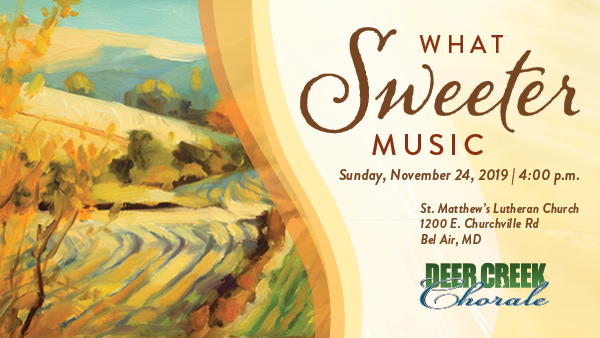Marty’s Program Notes
Welcome to “What Sweeter Music”, a concert which celebrates our many ‘simple gifts’ and prepares us for the Thanksgiving season. Certainly music is an integral blessing in all of our lives and the singers are excited to enrich you, the audience, with joyful repertoire which highlights music’s power to delight, inspire, educate and transform.
We begin with Thanks be to Thee, an adaptation of G. F. Handel’s Ombra Mai Fu which was the opening aria from his 1738 opera Serse. The original words “admire the shade of a plane tree.” Thanks be to Thee is a paraphrase from 1941 which fits our theme of giving thanks and will be used as a processional. Z. Randall Stroope, a good friend of the DCC and two-time guest conductor, sent me the 2016 composition, Consecrate the Place and Day, thinking the DCC would enjoy the excitement and complexity found in the setting of a song for Saint Cecilia dating from 1692. Cecilia of Rome was the patroness of musicians and on November 22, 230 AD which marks her death, a feast day to her was established and is still recognized by many religions today. “Whilst all with voice and instruments prepared, keep up the loud harmonious song!”
What Sweeter Music was composed in 1988 by popular British composer John Rutter to a text by lyric poet/cleric Robert Herrick 1591-1674. This is a carol of joy and announces the upcoming advent season. It opens with voices in unison singing “What sweeter Music can we bring than a carol for to sing.” Rutter then develops each verse with a variety of vocal and piano treatments culminating in “the darling of the world is come and fit it is, we find a room to welcome him.”
What greater poet in English history is there than William Shakespeare 1564-1616? In 1938, Ralph Vaughn Williams was commissioned to write a work to mark the 50th anniversary of Sir Henry J. Wood’s conducting debut. Williams chose Act V Scene 1 from the Merchant of Venice and incorporated 16 singers playing 8 Lorenzos and 8 Jessicas. The result was the Serenade to Music which is “widely regarded as one of the most beautiful and inspired of all settings of Shakespeare.” Today’s performance will feature string players from the Occasional Symphony with Shisa Suskey at the piano and the full choir and soloists interpreting the glorious text ending with “soft stillness and the night become the touches of sweet harmony.”
Whereas the first half offerings feature mostly British poets and composers, the second-half features mostly American. Please stand and join us in singing, Come ye thankful people come, raise the song of harvest home. Verses one and four will be sung in unison and two and three in parts. Join organist David Dasch and the DCC as we raise a joyful voice!
Eugene Butler was born in 1935 in Oklahoma and has had a long career as a composer, conductor, teacher and musician. Since 1998, he has devoted his time to composition of which he has over 700. Ode to Music was composed in 1972 to a text by a Unitarian minister/music critic John Sullivan Dwight who lived in the 1800s. This majestic setting of “music, the measure of the planets motion” paints a powerful picture of music affecting our heartbeats producing uniform vibrations and using triplet rhythm patterns, states “join all my soul and let all souls be one.”
Contemporary composer Dan Forrest is no stranger to the DCC. In 2018, we were thrilled to perform his Requiem of the Living at Carnegie Hall under my baton. A transformative experience for sure! Alway Something Sings is a setting of the poem Music by Romantic American poet Ralph Waldo Emerson 1803-1882. Within the poem are many references to nature which tie in with our overall theme this concert season. Singing is all around us whether in the song of a bird lifting our spirits during both glowing or dark periods or in the beauty of the human voice. Forrest captures this sentiment in his treatment of the poem using soaring melodies, lush harmonies and the interspersing of young voices to the texture. The string players will join in this performance.
I thank you God for most this amazing day brings all that we are thankful for into one place; a poem about the joy of life and how we should awake to the beauty that surrounds us every day. In E. E. Cummings words, “this is a song of praise.” A piano introduction unfolds slowly with wonderment, a central phrase of “I who have died am alive again today” returns frequently. This is an expression of
the rebirth of the soul with each “amazing day.” American composer Gwyneth Walker is special to the DCC organization. Not only have we performed much of her music but she was a guest of ours when we did a Mother’s Day concert entitled No Ordinary Woman: A Tribute to Mothers. Walker’s arrangement of this timeless poem is a joy to sing and to share with you on this amazing day!
At this special time of year, the familiar shaker melody Simple Gifts sums up the blessings which we all share. This arrangement by Lloyd Larson features four-hand piano with the youth choir joining the adults under the direction of Wayne Perry. Listen for the added verse which begins “as a gift to be loved and to love in return.” Our final piece this afternoon is another Rutter classic Look at the World scored
for children’s and mixed choirs. Listen closely to the lyrics which embody the season of harvest. The following text would be a most fitting prayer to share at your Thanksgiving feast: “Give us thankful hearts, that we may see: all the gifts we share, and every blessing, all things come of thee.”
Written by Martha Banghart

